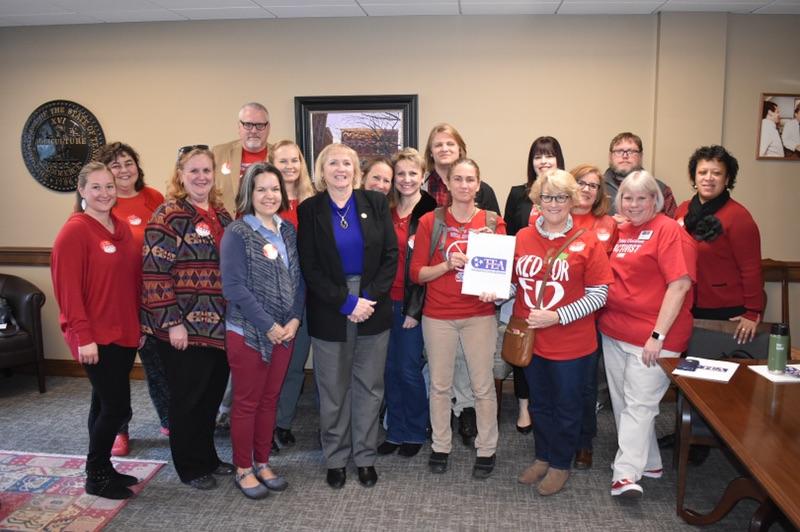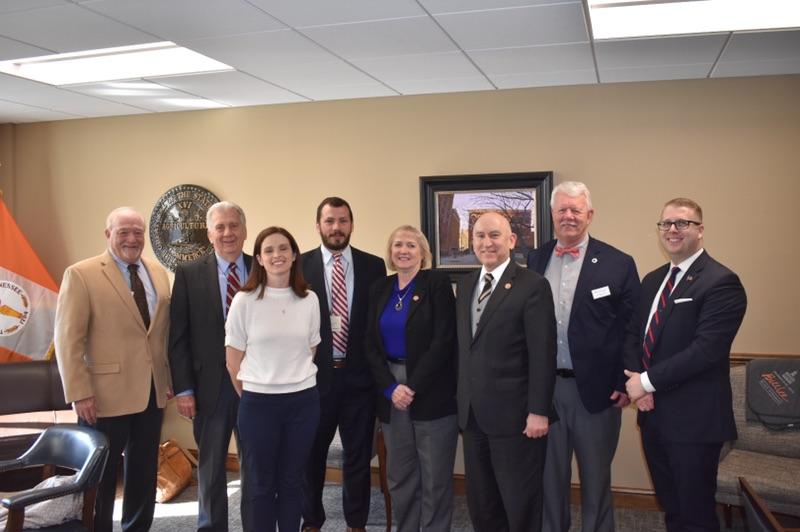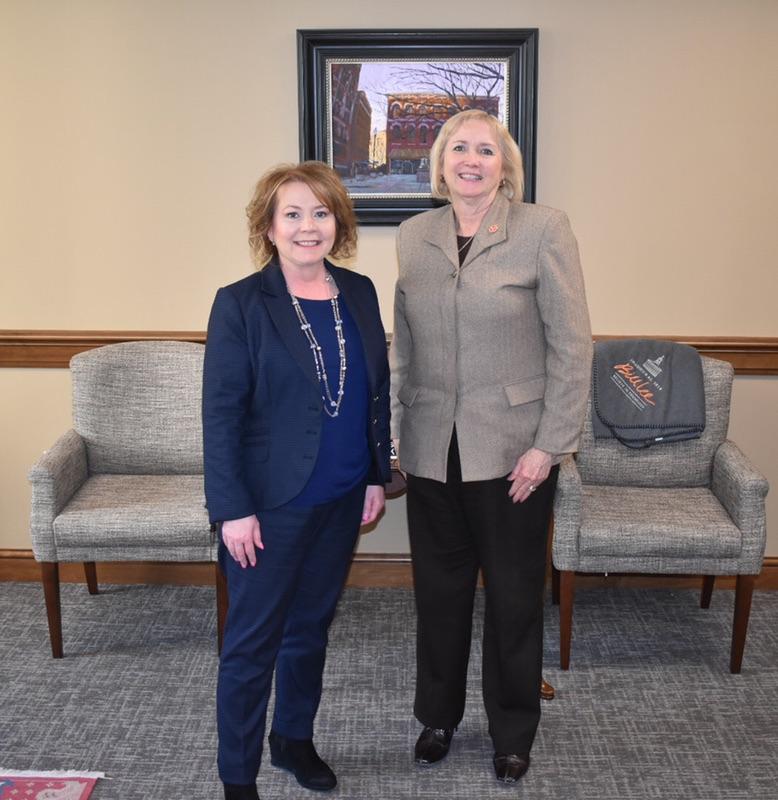
State Senators work to protect consumers from being victimized by scams
Senate Committees worked diligently last week, holding 10 more budget hearings and moving a number of important bills out of committee and to the Senate floor for final action. In a sign that the 2019 legislative session is beginning to wind down, the Senate Energy Committee has completed their business for the year, while several other committees have set final calendars for this week. Budget hearings will also conclude this week. Senate committees have successfully completed hearings on 52 of the 59 individual budgets of all departments and agencies of state government. The budget will be a key area of focus for the General Assembly during the remaining weeks of legislative action.
Among key bills advancing through Senate committees last week was legislation strengthening penalties for “spoofed” robocalls or texts that use fraudulent caller identification information to disguise the caller’s true identity. Spoofing technology is associated with many crimes involving consumer theft and fraud. Senate Bill 754 increases the penalty for caller identification spoofing from $10,000 to $30,000. It also asks providers of phone services to implement an effective framework by 2020 for authenticating calls to better enable them to identify and stop calls before they reach the consumer.
In addition, the legislation asks the state’s Attorney General to contact the Federal Communications Commission (FCC) regarding the creation of new rules at the federal level that allow telephone carriers to block more illegal robocalls being made to consumers in this state and across the country.
Action on the bill follows a law passed in 2017 which made it a crime to use spoofing technology with the intent to defraud or cause harm to another person. Spoofing technology has advanced over the last several years and continues to grow at a rapid pace. As a result, imposter scams and identity thefts have increased. Tennessee ranks in the top ten states in the nation for the highest rate of fraud per capita according to a report released last year by the U.S. Federal Trade Commission (FTC), with these two items listed among the top three reasons for the state’s high ranking.
The legislation now moves from the Senate Commerce and Labor Committee to the floor of the Senate for final consideration.
A separate consumer bill, which was approved by the Senate Judiciary Committee, aims to protect elderly and vulnerable adults who are victimized through telephone calls or electronic means. Senate Bill 534 broadens the offense of financial exploitation of an elderly or vulnerable person to include use of a telephone or other electronic communication device to obtain money, property or anything of value. It would enhance penalties for the crime from a Class E to a Class C felony, carrying an average of 2.34 additional years of jail time for convicted offenders.
Steve Crump, Judicial District Attorney for the 10th District in Tennessee, told Judiciary Committee members about the difficulty in prosecuting the crime when the “ultimate recipient” is a scammer located outside the U.S. However, Crump said that persons holding bank accounts within Tennessee have been involved in the fraudulent schemes, receiving consumer money wired to them before transferring it overseas. This puts more clarity in the law and gives DAs district attorneys more direction on how to prosecute these cases.
Legislation protecting healthcare consumers and Tennessee’s independent pharmacies receives approval by the Senate Commerce and Labor Committee
Legislation that will provide support to healthcare consumers in Tennessee and the pharmacies that provide care to them was approved by the Senate Commerce and Labor Committee this week. Senate Bill 650 establishes certain rights for pharmacies regarding fair contracts with Pharmacy Benefit Managers (PBMs), including the protection of a pharmacist’s professional judgement when determining when to dispense a drug or another product to a patient.
PBMs are third-party administrators of prescription drug programs for commercial health plans, self-insured employer plans, and government employee plans. While originally created to process prescription drug claims and create a pharmacy network, PBMs have significantly grown in their size and influence over the past few decades. Currently, only three PBMs control approximately 80 percent of the prescription drug marketplace, giving them influence over patient access to prescription drugs. The PBMs also utilize spread pricing and negotiation of rebates from pharmaceutical manufacturers to gain a stronghold over the prescription drug process, absent of any role in the development of prescription drugs or direct interaction with patients.
In an effort to establish a fair playing field between PBMs and pharmacies, other provisions of the bill include protections for pharmacists regarding audits and recoupments of prescription claims. It also increases transparency and disclosure of all fees charged to pharmacies by PBMs at the time of claims processing and requires 30 days advance notification to the pharmacy of any network changes.
The bill now goes to the Senate Finance, Ways and Means Committee for approval of its financial impact before moving to the Senate floor for final consideration.
In other action aiding healthcare consumers, the Senate approved legislation clarifying a law passed through the General Assembly last year to provide transparency in in medical charges by hospitals. Senate Bill 1120 makes technical changes and streamlines the process so that hospitals and other facilities continue to provide patients with information to better inform their healthcare decisions and understand the complexities of the healthcare delivery system.
Finally, legislation was approved enhancing a law passed last year authorizing physicians to accept goods or services in exchange for healthcare services not covered by health insurance or other means of payment in a direct exchange of barter. Senate Bill 1206 expands the law to all healthcare professionals.
Both bills were also approved by the Senate Commerce Committee and will be heard next by the full Senate for a final vote.

Road Builders Day on the Hill always brings out a big turnout

It was an honor to meet with members of 4-H in Knox County on their Day on the Hill
Governor Lee’s legislative package to improve education and student safety continues to advance in Senate
Legislation proposed by Governor Bill Lee to improve education and student safety in Tennessee continued to advance in the State Senate, including final approval of a bill doubling funds in the state’s School Safety Grant Program. Senate Bill 803 accommodates underserved counties working to secure schools and fill School Resource Officer (SRO) positions by adjusting the match requirements to be proportional with districts’ fiscal capacity. The legislation allows schools that currently have an SRO to use the grants to fund other school safety priorities, including implementation of building security measures or developing youth violence prevention programs. The bill now goes to Governor Lee’s desk for his signature.
Final approval was also given to legislation cleaning up state law to ensure smooth implementation of Governor Lee’s initiatives related to career and technical education. Senate Bill 808 also makes changes necessary for the new reauthorization of the federal Carl D. Perkins Career and Technical Education Act.
Action on the career and technical education legislation follows the unanimous Senate approval of the Governor’s Investment in Vocational Education (GIVE) Act. That legislation provided for fully-funded dual enrollment credits for trade and technical programs for high school students and set up a system of competitive grants to develop work-based learning and apprenticeship opportunities.
Two more bills in the governor’s education package advanced through the Senate Government Operations Committee this week. Members of the committee approved Senate Bill 801 establishing the Agriculture Education and Youth Participation Task Force with the goal of preparing students for higher education and success in Tennessee’s agricultural sector. It now moves to the Senate floor for final consideration.
Committee members also approved Senate Bill 796 which creates an independent state commission to approve high-quality public charter schools. It gives the new Tennessee Public Charter School Commission the authority to review appeals, a task currently held by the State Board of Education. The legislation now heads to the Senate Finance, Ways and Means Committee for consideration of its financial impact before being heard by the full Senate for a final vote.
Legislation to create additional Safe Baby Courts in Tennessee passes Senate Judiciary Committee
Legislation adding five new Safe Baby Courts to the state’s seven existing programs unanimously passed the Senate Judiciary Committee this week. Tennessee’s Safe Baby Court program was established in 2015 with the primary goal to improve the care of children who are placed under court jurisdiction. It aims to ensure secure and permanent placement for those children by focusing on rehabilitating parents who suffer from substance abuse disorders so they can be reunited with their children.
These courts have proven to be successful and the hope is to see more lives positively impacted with the program’s expansion. Senate Bill 649 is a result of the state’s ongoing efforts to develop these courts and seeks to assist them as they continue to grow.
In addition to the creation of five new courts, which is funded in the governor’s budget, the legislation also:
· Authorizes the creation of additional Safe Baby Courts, if funding is available;
· Gives the Administrative Office of the Courts (AOC) the authority to determine locations of Safe Baby Courts;
· Clarifies that a case can be referred to a Safe Baby Court at any time as long as it meets the criteria;
· Clarifies that the Safe Baby Court judge can terminate an individual’s participation in the program at any time if the participant fails to comply with the program’s requirements;
· Establishes an informal Safe Baby Court Advisory Committee; and
· Provides the departments guidance related to the use of volunteers and expanding Safe Baby Courts into adjacent counties.
The Safe Baby Court program does not have a set duration for participants. Court staff and the presiding judge and magistrate track the progress of enrollees over a period of months as they attend support group meetings, take life skill and parenting classes, and receive mental health therapy and counseling. However, not all parents who go through the Safe Baby Court program are reunited with their children.

I was pleased to visit Knoxville area educators
In Brief…
Court Jurisdiction / Divorce Cases — Legislation was approved last week clarifying that trial courts can continue to hear divorce cases, modification of parenting plans, and other domestic relations cases, even when an allegation of dependency and neglect is alleged. In Tennessee, both circuit courts and chancery courts are authorized to grant divorces and to make child custody determinations in connection with divorce proceedings. However, as recently ruled by the Tennessee Court of Appeals, subject matter jurisdiction of circuit and chancery courts over divorce proceedings and subsequent child custody matters must be considered in conjunction with the exclusive jurisdiction allocated to juvenile courts by state law. This includes any cases where it is alleged that a child is dependent, unruly, neglected or delinquent. Senate Bill 719 provides that trial courts have jurisdiction in domestic relations cases and can continue to hear them, regardless of such allegations.
Bus Cameras / Parental Rights — State Senators gave final approval to legislation this week setting up a process to ensure parents are allowed to view photos or video footage installed on a school bus in certain circumstances. Senate Bill 182 requires Local Boards of Education (LEAs) to adopt policies regarding how the video surveillance would be reviewed. The policy must provide that a parent can review the footage within a certain timeframe under the supervision of a director of schools, a school principal or other school officials. The policy must also be in compliance with the federal Family Education Rights and Privacy Act. The legislation does not require LEAs to purchase cameras for their school buses if not already in place. The proposal now awaits action in the House of Representatives.
Tax Equity / Car Washes — In continuing efforts to provide for a fair and equitable tax system, state senators passed Senate Bill 237 last week which clarifies that services related to automatic car washes are not subject to state and local sales tax. Currently, there is no legislative authority that specifically addresses the taxation of car washes, and a sales tax has not been imposed on these facilities in almost 50 years. However, recently an obscure provision of the tax code related to coin-operated facilities was used to retroactively apply the sales tax law to express model car washes. Such interpretation of the sales tax law could impact car wash operators across the state, including hundreds of small businesses which would suffer the tax inequity most severely. The legislation now moves to Governor Bill Lee’s desk for his signature.
Hair Braiding / Right to Earn a Living — Legislation seeking to reduce the barrier to entry for persons seeking a license to engage in natural hair braiding passed the full Senate this week. Currently, natural hair braiders must complete 300 hours of coursework, which costs between $2,000 and $3,000. They must also pay $60 biennially to the Board of Cosmetology and Barber Examiners for a license. Senate Bill 1185 exempts individuals who engage in natural hair braiding from the board’s licensing requirement. Under the legislation, hair braiders must attend 16 hours of training in health and hygiene, register biennially with the Department of Commerce and Insurance, and submit a $30 fee. The proposal does not affect cosmetology services or any braiding that includes cutting, extensions, or the use of heat, chemicals, glue or any styling tools other than a comb.
The legislation continues Republican lawmakers’ ongoing efforts to remove burdensome regulations on businesses and lower barriers to entry on the right of Tennesseans to earn a living.
Life in Prison without Parole /Aggravated Rape of a Child — The Senate Judiciary unanimously approved legislation increasing penalties for aggravated rape of child. Under current law, a person convicted of this offence is sentenced to 34 to 60 years in prison with a fine of no more than $50,000. Senate Bill 290 establishes that no sentencing hearing shall take place and that all persons convicted of aggravated rape of a child will be sentenced to life in prison without the possibility of parole. The bill moves to the full Senate next to receive a final vote.
Child Sexual Predators — Legislation passed the Senate Judiciary Committee which creates Class E felony offense for possessing an obscene child-like sex doll which is anatomically correct. Senate Bill 659 also adds a Class A misdemeanor to the crime if the offense involves distributing, selling, or transferring the doll with the intent to sell it. Those offenders would also face fines of $10,000 to $50,000. The bill now moves to the full Senate to receive final approval.
MyTN Mobile Application — The Department of Finance and Administration presented their budget to the Finance, Ways, and Means Committee Tuesday. Included in their presentation was an overview of the MyTN mobile application (app) currently in development. The department is currently working to build the needed infrastructure for the app, as well as working with other government agencies to incorporate their services and programs into MyTN. Chief Information Officer Stephanie Dedmon explained that by creating a single presence, Tennesseans can visit one online location to take care of all their transactions rather than dealing with each agency individually. The MyTN app will break down government walls thus saving the state’s citizens and businesses time and effort.
Hemp Task Force — The full Senate voted to create an advisory task force to study the processing, testing, transporting, and regulation of hemp products in Tennessee and its economic impact on rural areas of the state. Historically, industrial hemp has been regarded primarily as an agricultural crop valued for fiber and grain. Hemp fiber is used to make textiles, building materials, animal bedding, mulch, paper, industrial products, and biofuels. Hemp grain, or seed, is used in food and feed products, while the oil from the seed is used to make personal care products and industrial products, including paints, solvents, and lubricants. Senate Bill 888 proposes the 12-member task force would hear testimony from persons with expertise or knowledge in the hemp industry and report back no later than January 2020 regarding their findings and recommendations.
Appalachian Dialect — A resolution passed through the full Senate recognizing the Appalachian Mountain region as a legitimate dialect which deserves respect and honor. The dialect is often disparaged, despite its vast history and extensive reach. Therefore, Senate Joint Resolution 227 urges the Secretary of State to include a discussion of the significance and history of the Appalachian dialect in Section VI of the Tennessee Blue Book which already discusses A History of Tennessee: The Land and Native People.
New Jobs Report Card — The Department of Economic and Community Development (ECD) presented their budget to members of the Senate Commerce and Labor Committee this week, reporting that 20,600 new jobs were created in Tennessee during 2018. The 2018 ECD report card shows 127 projects with capital expenditures of $4.3 billion. It also reflects a healthy $1.6 billion in foreign direct investment, resulting in 6,400 new job commitments in 37 projects. The department reiterated their commitment to improving job development in rural communities. Seventy site development grants, representing $26 million in funding, were awarded to 48 counties in Tennessee. Twenty-two Broadband Accessibility Grants were also awarded to 27 Tennessee counties to improve connectivity.
Law Enforcement Officers / Lifetime Handgun Carry Permit – Legislation removing the fee for obtaining a lifetime handgun carry permit for former law enforcement officers has passed the Senate on final consideration. Senate Bill 1347 removes the current $100 application fee for former law enforcement officers to obtain a lifetime handgun carry permit. In order to receive the fee waiver an officer must have served at least 10 years and left the law enforcement agency while in good standing.

Officials from Farragut stopped by to discuss issues of importance to them with Senator Briggs and myself

I enjoyed my visit with Kelli Chaney, President of Tennessee College of Applied Technology-Knoxville

Representative of Senior Olympics stopped by

Lisa New and Sharon Moore, from the Knoxville Zoo, stopped by for a visit.

I enjoyed having Knox County retired teachers stop by for a visit
For information on State Senators including phone numbers and email addresses, click Tennessee State Senators.
For House members, click Tennessee House Members
For all other information on the General Assembly including legislation, schedules and videos, click Tennessee General Assembly
As always thank you for continued support!
Sincerely,
Becky Massey
District 6 Senator
615-741-1648.
